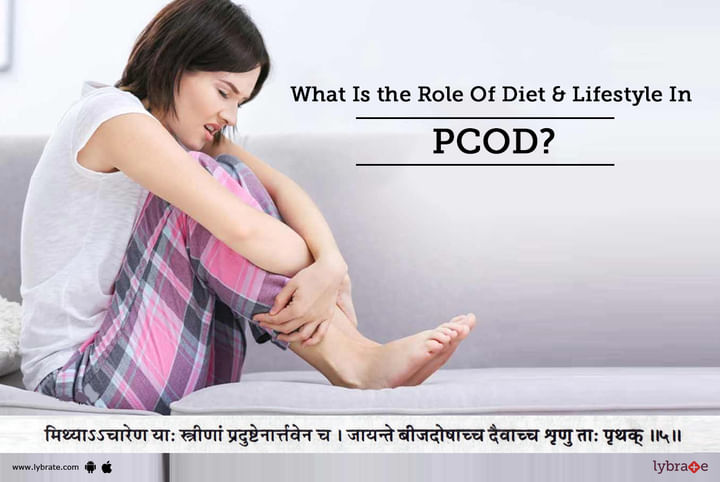What Is the Role Of Diet & Lifestyle In PCOD?
Meaning of the shlok mentioned in the image above - Causes of gynecological disorders- 20 types of gynecological diseases in females are caused due to unhealthy diet and lifestyle due to which the menstrual cycle is disturbed. Genetic predisposition due to parents, genetic abnormal mutations or bad deeds of previous life cause these diseases. Now the further description of these 20 types of diseases is given.
Reference - Sushrut Samhita, uttar tantram, chapter no. 38, shloka no. 5
Nowadays everybody wants to be good at everything either it be their work or personal life. These irrelevant hurries and worries have made people forget about the importance of proper eating habits, healthy lifestyle and proper emotional balance. Imbalance of all these things leads to lifestyle disorders and PCOD is one of them.
Polycystic ovarian disease (PCOD) or polycystic ovarian syndrome (PCOS) is a common lifestyle disorder. Its occurrence is increasing in the younger generation with every passing day. Statistics of this disease is growing and according to the latest studies in India, every fourth woman is having PCOD. A sedentary lifestyle is said to be the most common cause of this disease and that’s why PCOD is more common in the urban population than the rural one. As in cities, people have a more sedentary lifestyle and unhealthier eating habits than the people living in villages. In villages, people are more active and eat light and healthy food, at least lighter than the urban population. Bad eating habits and unhealthy lifestyle are the main causes of every second disease. Similarly, PCOD is also a lifestyle disorder developed from unhealthy eating and living. It should be treated properly as if remained for the long term in the body can cause many complications like infertility, gynecological problems, hypertension, gestational diabetes, and depression.
PCOD affects women during their reproductive lives. As its name suggests, in this disease ovaries may have multiple cysts in them which alter the functioning of ovaries. Its initial symptoms may include acne, facial hair, irregular and painful menstrual cycle, and weight gain. In PCOD there is an increase of male hormones in the body leading to above said signs and symptoms.
Its increased occurrence can have many reasons along with unhealthy lifestyle and diets like genetic predisposition, nutritional deficiencies, poor immunity, and other metabolic disorders. Genetic predisposition or family history increase the risk of occurrence of PCOD but it doesn’t mean that one will suffer from it if there is family history.
Ayurveda, the science of life is the most ancient system of medicine discovered in India. According to its basic learning, prevention and management are half of the treatment. Through diet (aahar), lifestyle (vihaar) and medicine (aushadh) complete cure of the disease can be obtained. Balanced aahar (diet) is the most important pillar to achieve a healthy life and to treat disease.
According to Ayurveda, there are three vital doshas which govern the human body and its functioning, i.e. Vata, Pitta, and Kapha Dosha. Any deviation or vitiation in these doshas results in the causation of the disease. As per Ayurveda, there is Shukra dhatu in both males and females. This Shukra dhatu maintains the normal functioning and health or reproductive system. In females, it consists of estrogen and male androgen hormones. Infertility can be caused due to an imbalance of any of these hormones. Hence, excessive secretion of androgen in females might cause polycystic ovarian disease.
Females affecting from PCOD should take a balanced diet which is rich in fiber and contains lean protein as it will help to fight insulin resistance. As weight gain is one of the main causes of concern and issue in PCOD so to fight with this, take small meals at small intervals instead of taking three heavy meals at long intervals. This way patient can lose unwanted weight. But the fancy crash diet courses should not be an option as it can lead to nutritional deficiencies. Women having PCOD should avoid taking food rich in carbohydrate and foods having a high glycemic index. Try to have food which is full of green vegetables and fruits. Abstain from junk, processed, packaged and heavy foods. Refined salt, flour, sugar and oil are really bad for the health of a PCOD patient. Avoid unhealthy fats and try to take healthy fats like mustard oil, ghee, sesame, seeds, and cashew nuts. There is one main problem in this disease that the person might feel that she is taking a good diet but due to internal chronic inflammation, it is not being used up properly, as in PCOD. Hence nutritional deficiencies are common in which some of the common deficiencies are vitamin B12, vitamin D, magnesium, zinc, and folate.
Some of the major things which a woman suffering from PCOS should follow are:
- Avoid or decrease the intake of milk and milk products except buttermilk which can be taken.
- Have proper and sound sleep in the night as sleep deprivation can lead to many health problems.
- Avoid sleeping in the daytime as it may cause disturbed sleep at night.
- Say no to any kind of junk, processed and packaged food.
- It is recommended to avoid red meat, eggs, and deep-fried food. Although fish can be taken in some amount once in a while.
- Sugar-containing foods increase Kapha which obstruct the body channels causing health ailments. Hence, go with honey instead of sugar.
- Do not take nuts however beans can be taken.
- Avoid taking sweet potatoes and potatoes as they cause weight gain, one of the main problems in PCOD.
- Refrain from any kind of negative feeling like anger, jealousy and stress as mental uneasiness as these can result in physical diseases.
- Do not overburden yourself from work which is more than your capacity and strength.
- Do not overuse contraceptives as it causes an imbalance of hormones.
- Take only moderate amount of rice and wheat as they increase Kapha in the body.
- Quit alcohol, smoking, and use of narcotics as they disturb the menstrual cycles leading to many gynecological disorders.
- Exercise daily for at least 30 minutes every day as lack of exercise and increased weight can cause insulin resistance in the patient leading to diabetes.
Do not use any type of gadgets at least 1 hour before sleeping as using them before sleep can disturb the sleep.



+1.svg)
